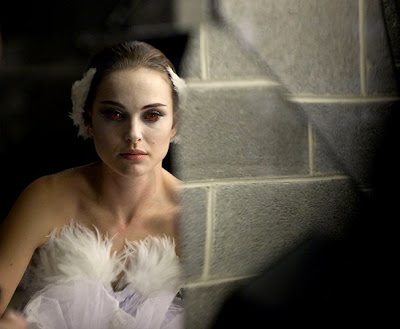It's taken me a while to write this review. I actually saw the film the night it opened: just me and a sea of strangers in a huge theatre, drinking soda as the lights went down, breathlessly anticipating this weird, incredible film. I had a lot of expectations going into it but I tried to keep them generalized. The dancing will be exquisite. The cinematography will be arresting. The acting will be stellar. All these things are true of Black Swan. But, it is so much more than that, and I would do it a disservice to stop there.
Warning: if you have not seen the film and still intend to, there are spoilers ahead.
 Natalie Portman (giving the performance of her young career) plays ingenue Nina Sayers, a member of the corps of a ballet company who unexpectedly gets her chance to play the part few ballerinas would ever pass up: The Swan Queen in Swan Lake. It is demanding, asking the dancer to play two distinctly different roles: that of Odette, the innocent, sweet White Swan, and Odile, the sexual, aggressive Black Swan.
Natalie Portman (giving the performance of her young career) plays ingenue Nina Sayers, a member of the corps of a ballet company who unexpectedly gets her chance to play the part few ballerinas would ever pass up: The Swan Queen in Swan Lake. It is demanding, asking the dancer to play two distinctly different roles: that of Odette, the innocent, sweet White Swan, and Odile, the sexual, aggressive Black Swan.  The choreographer, played with sharp wit and genuine arrogant nastiness by one of my favorite French actors, Vincent Cassel, believes she can easily play the White Swan: Nina is driven to perform perfectly, and her dancing is beautiful but cold and impersonal. She is weak, sensitive, and frightened. But, the choreographer Leroy doesn't feel that she has it in her to be the Black Swan, and he wastes no time badgering and beliettling her at every turn, trying to beat her down and force her to lash out, to create a Black Swan out of what he sees as a little mouse of a girl.
The choreographer, played with sharp wit and genuine arrogant nastiness by one of my favorite French actors, Vincent Cassel, believes she can easily play the White Swan: Nina is driven to perform perfectly, and her dancing is beautiful but cold and impersonal. She is weak, sensitive, and frightened. But, the choreographer Leroy doesn't feel that she has it in her to be the Black Swan, and he wastes no time badgering and beliettling her at every turn, trying to beat her down and force her to lash out, to create a Black Swan out of what he sees as a little mouse of a girl. Nina cannot see herself as the Black Swan either, though she tortures herself constantly to find it within. Her mother, played with frightening and obsessive sweetness by Barbara Hershey, keeps Nina enshrined in a prison of pink frills and stuffed animals, living her own lost ballet career through her daughter: she is Nina's only companion, her friend, her taskmaster, her jailer. She watches Nina at every moment, encasing her hands in mittens to keep her from nervously scratching herself, painting disturbing portraits of her daughter over and over again. Watching this relationship, we begin to understand the naivete that Nina has, her sexual innocence, her quiet desperation to escape when the promise of something else begins to present itself.
Her rival, her tantalizing counterpart, and her possibility for escape appears in the form of Mila Kunis' Lily, a dancer who eats whatever she wants, fucks whomever she pleases, rolls bennies, screws up in rehearsal and laughs it off, and always seems to be right behind Nina, ready to help her expand her horizons, or perhaps push her right over that horizon and take her place. Lily is fierce and wild and everything Nina is striving for, and cannot seem to achieve. Nina wants her, wants to be her, hates her, and fears her all at once. And, Kunis plays her with just the right amount of bitch so that you're never quite sure if Lily is actually trying to destroy Nina, or if Nina is making most of it up in her head.
And, in her head is where Nina begins to unravel. She cannot push herself hard enough, it seems, to be perfect, to be what Leroy needs, what her mother expects, what Lily is. She starts to hallucinate: strangers wear her face; she bleeds from wounds she doesn't remember inflicting and tears her own skin apart in pieces; she seems to be intent on harming herself.
And, all this crescendoes to bring the Black Swan out: the aggressive, assertive, slightly frightening and glorious creature who dances the second act with a furor none of the dancers have ever seen before, especially from Nina. She transforms before our eyes, literally and figuratively, until you're no longer sure as the viewer what is performance and what is pure creation from Nina's increasingly disturbed mind. Is she growing wings? Has she murdered her rival and stashed her in her dressing room? By the end, even Nina can't be sure anymore.
Her triumph culminates in the perfection of the third act, and though it is short-lived, she looks radiant finally as she revels in having danced, finally, the best she possibly could have. She has finally danced "perfectly", and she gives everything to this: her body, her mind, her heart. She has destroyed herself before our eyes, to thunderous applause.
I could not write this review for weeks. After leaving the theatre, I had to catch my breath and slow my heart down. The truth is, I don't think there is a single artist out there who has not felt the drive that destroys Nina. That drive to be perfexct, to push yourself just a little harder, just a little farther, to practice longer, to achieve the impossible. I found myself envying her at times and then feeling ashamed for doing it, knowing how destructive she was being and unable to help admiring her a little for it. In the final shot, as she lay demolished for her art, I felt my chest swell against my will at the sound of the applause for her performance. It was disturbing and frightening to see myself in her, and while every theatre-goer will get something different out of the film, that was what I took away with me, and what stays with me still: to me, Black Swan represents the lengths we will go to to achieve perfection. And what perfection truly costs.
I have been a White Swan for a long time, and sometimes yearn to be a little more like the Black Swan in my own life. But, when I do, I think of ruined Nina Sayers, and realize that sometimes, the price is just too high.









































2 comments:
The message I got from the film was that perfection is an obliteration of the self. Which seems plausible to me. And terrifying. But you're right about artists, because I thought the applause were overwhelming too--and given how little normalcy Nina had in her life, they were worth it.
I also thought the parallel between Nina and Lily wasn't just careful girl vs. wild girl--but external validation vs. internal validation. Artists use what's inside them to create beautiful things, and they receive validation and praise from others. But Lily used what was outside of her (food, guys, drugs, even taking Nina out on the town) to find validation inside herself, and make own private happiness.
It's the question of whether you want to push yourself and create something amazing through blood sweat and tears...or if you want to live a carefree easygoing life, but leave nothing behind.
~Witch not Crier
Looks great, can't wait to see it - the ads haven't even been seem in Australia yet.
Post a Comment